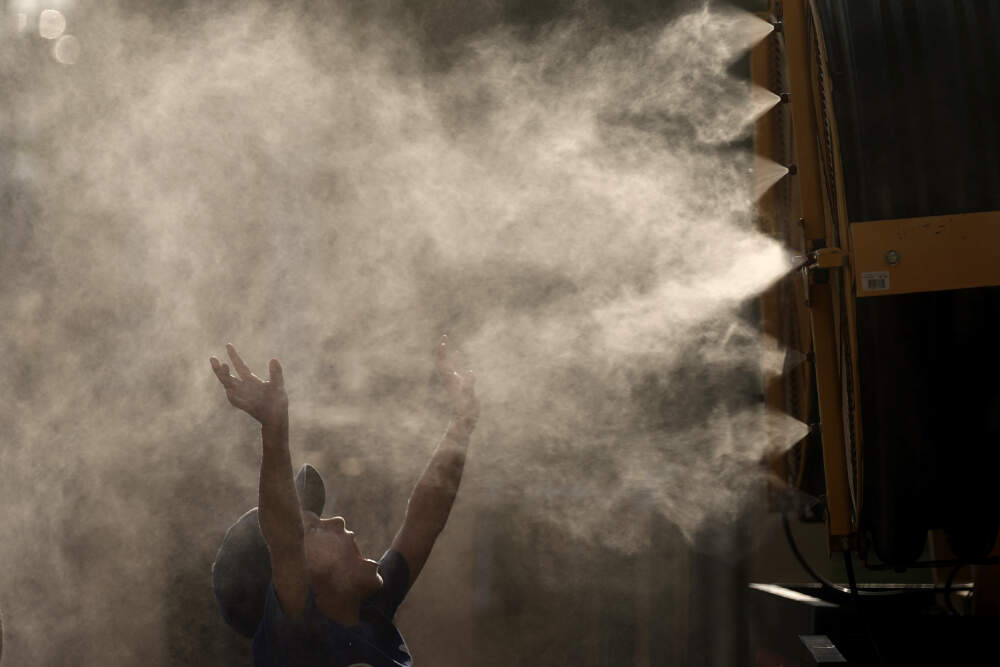Advertisement
Commentary
Why aren’t schools teaching kids about climate change?

Summer vacation is here, but somehow summers have lost their innocence. After all, humanity just experienced the four hottest days ever recorded and scientists say 2023 is on track to become one of the hottest years on record yet again. That smoky air from hundreds of ongoing Canadian wildfires is forcing us to accept that climate change is no longer an invisible threat. We can see it, smell it, feel it.
Perhaps that’s also why a recent NPR/Ipsos poll suggested that a majority of American parents and teachers want their kids to learn about climate change. But the poll also confirmed that there is hardly any climate education in our schools: “most teachers aren't actually talking about climate change in their classrooms.”
I was not at all surprised. “If you’re right about all this” one student at Wellesley High School had said to me after a presentation about climate change not long ago, “then why aren’t they telling us?”
His question hit me like a punch in the stomach. Indeed, why aren’t we? Climate change is going to affect their entire lives. They have a right to know where we are headed. It will not only help them consider their future careers. It will help them survive. And it should not just be science education. Kids need to know more than why it’s happening. They need the knowledge and the skills to deal with it, too. All disciplines are called upon to help students prepare for what’s to come.
It’s somehow more disturbing that Massachusetts is no exception. “Massachusetts, a science and biotech center, ranked very low in a study of climate change curriculum policy,” concluded Renee Cho, author and regular contributor to the Columbia Climate School earlier this year. Cho pointed to Rabiya Arif Ansari and Jennifer M. Landin’s recent study of 57 college biology textbooks published between 1970 and 2019. The experts found that coverage of climate change had actually decreased during that period. As had the focus on solutions to the crisis. No surprise, then, that our students feel unprepared.
Megan O’Donnell, a recent graduate of Wayland High School (WHS), devoted her senior project to researching what teachers at WHS are teaching about climate change. Her results show clearly that there is a lot of room for improvement. Unless a student is enrolled in a particular level of chemistry, it seems, they will not encounter any climate science during their four years of high school. If they happen to be enrolled in a foreign language, they may talk about the issue of global warming in French or Spanish. If they have a committed English teacher, they will read about it in English class. That’s it.
Advertisement
Tara Sawrikar, a 10th-grade WHS student, who also serves as a student member on Wayland’s Climate and Energy Committee, surveyed WHS students, asking them how worried they are about climate change, whether they have taken a class or a unit on the subject and what they wish they had learned about it. Of the 38 students who responded, the large majority (71%) said they were concerned or very concerned, and about 66% said they had not encountered a class or unit about the subject.
Sawrikar does not claim to have interviewed a representative sample, and O’Donnell and Sawrikar’s interest was spurred by their 8th-grade science teachers. Indeed, the Wayland Middle School science curriculum does include a few weeks of climate education at the very end. But there is only so much a single unit in 8th grade can cover.
But what hits home the most in Sawrikar’s survey results are the students’ responses to the question about what they wish they had been taught. “Everything,” two of them say. Other answers: “Anything more about it”; “Maybe some more baseline knowledge like what exactly is happening and why”; “about how bad it really is and what we can do and why it matters.” Perhaps now you feel that punch to the stomach, too?
'If you’re right about all this, then why aren’t they telling us?'
Wellesley High School student
It’s not like there are no good resources that teachers can incorporate. There’s an abundance — from NASA to NOAA, from the NRDC to National Geographic. There are cool projects like the Vancouver-based Planet Protector Academy. Here in Massachusetts, too, there are Cooler Communities, and the youth education offered by the Mystic River Watershed Association.
And universities are beginning to act. My own school, Brandeis University, has a precollege program for youngsters interested in climate science and activism, and we started offering a minor in Climate Justice, Science and Society a couple of years ago. Emerson College launched a climate justice initiative this spring. In her final report, Megan O’Donnell also highlights MIT’s Climate Action Through Education program that aims to produce a climate change curriculum for a number of high school subjects.
Recently, some states have made progress: New Jersey was the first state to require climate education and Connecticut will follow next year. Massachusetts should be a leader, but is far from it. A couple of bills about improving climate education were proposed this session — for example H 470 and H 496 which has the support of the Massachusetts Youth Climate Coalition — but they have hardly moved forward since February.
Many teachers say they aren’t able to fit climate education into the curriculum, given the pressures of standardized testing. That’s why another bill, the Thrive Act, supported by the Massachusetts Teachers Association, may have the best chance to move us in the right direction. It’s not a climate bill, but if we reduce “teaching to the test," that would make climate education easier to fit in.
The majority of parents agree that climate literacy should be a priority. You could call not equipping our kids with the knowledge and skills they will need to survive a form of criminal neglect. Make sure your state legislators support these bills. Most importantly, talk about climate change with your kids this summer. They deserve to know, and it obviously won’t help to wait until they’re back to school.
